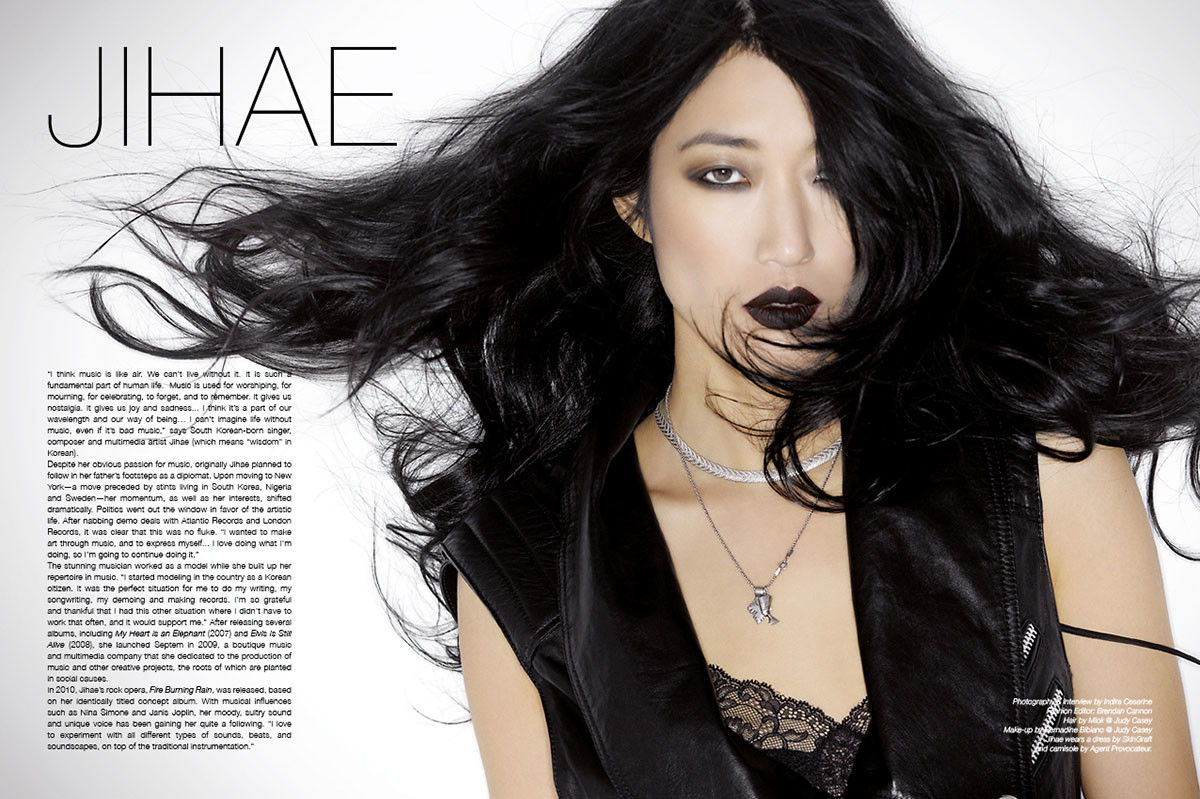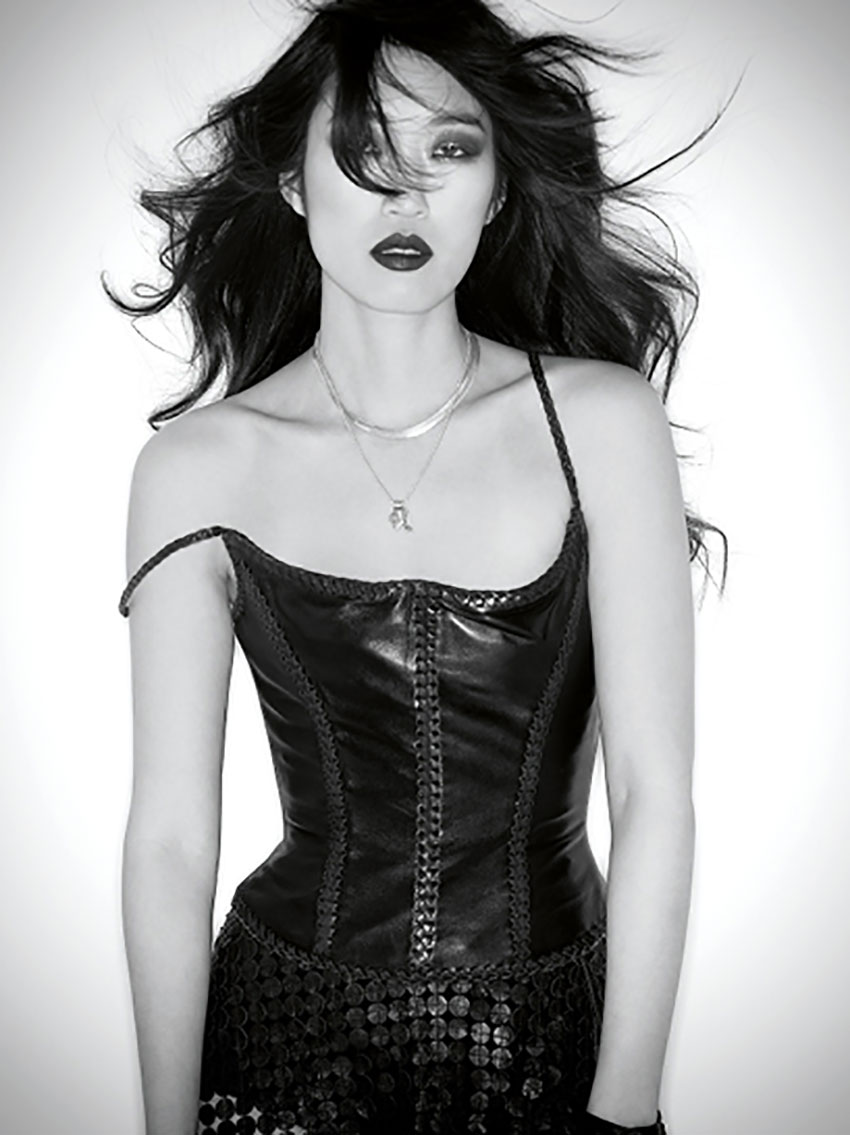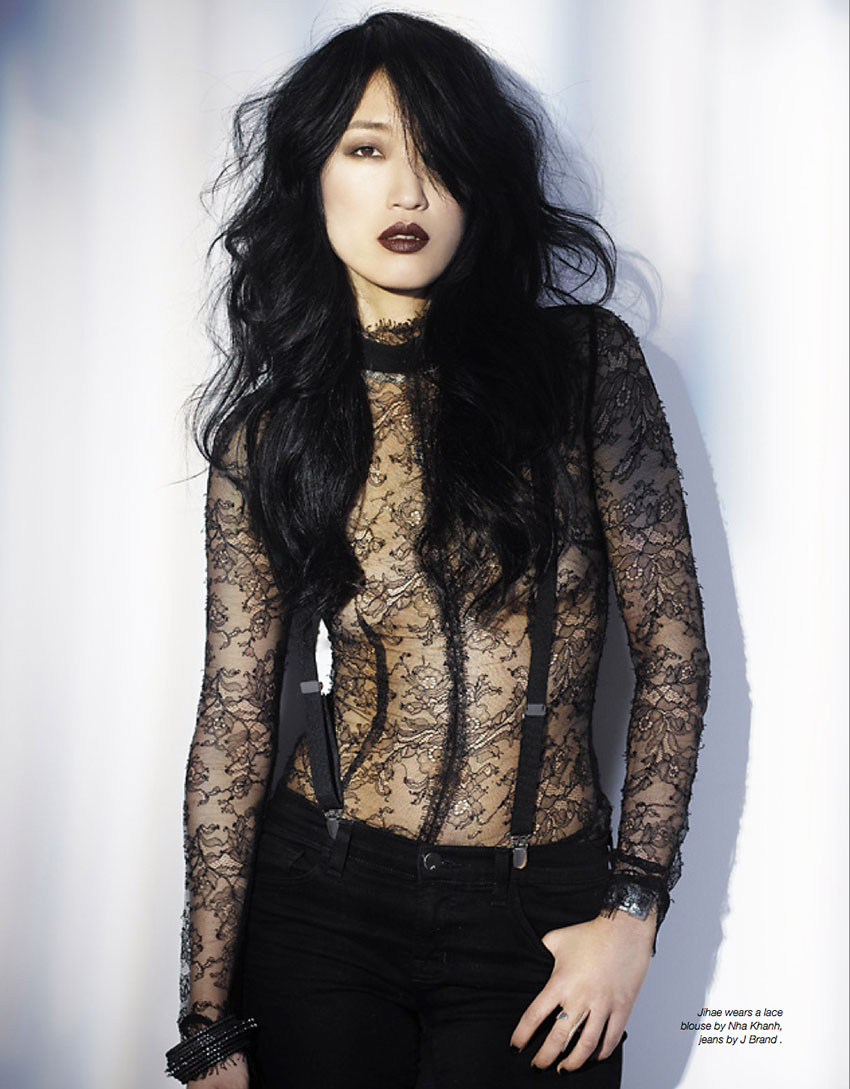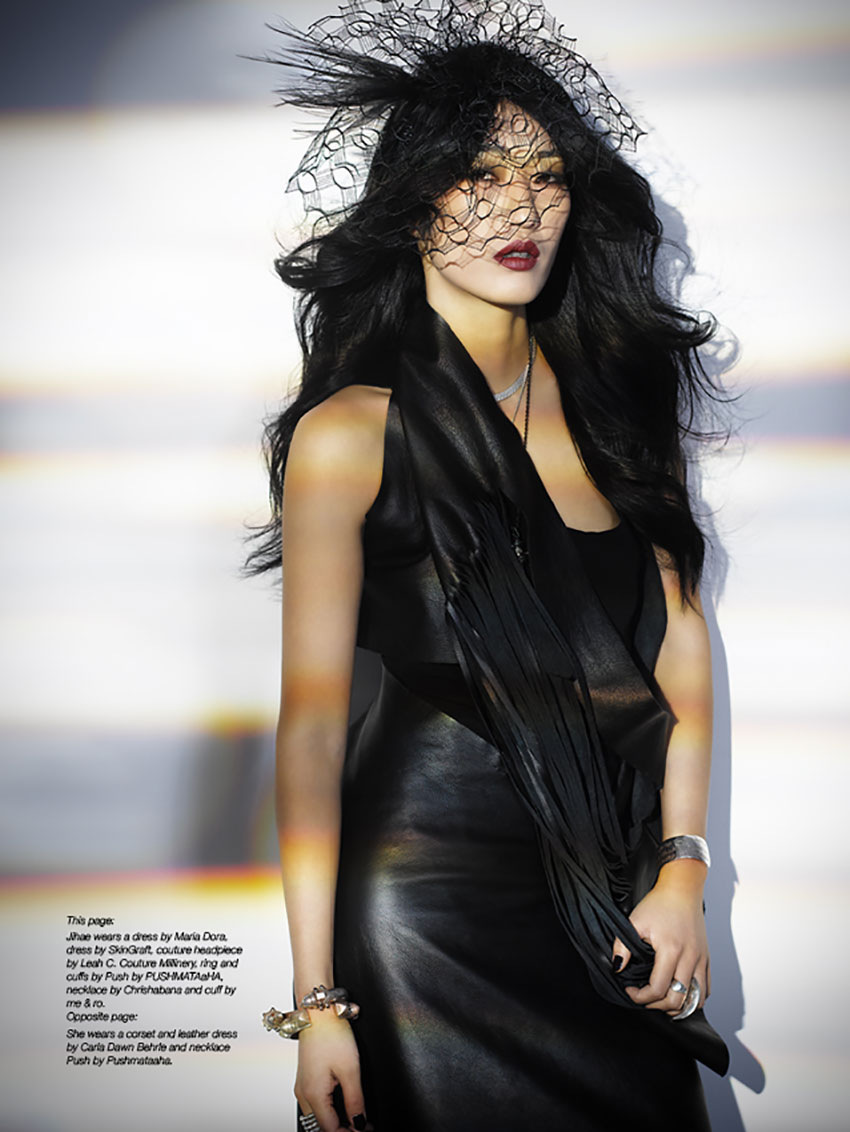
“I think music is like air. We can’t live without it. It is such a fundamental part of human life. Music is used for worshipping, for mourning, for celebrating, to forget, and to remember. It gives us nostalgia. It gives us joy and sadness… I think it’s a part of our wavelength and our way of being…I can’t imagine life without music, even if it’s bad music.” -Jihae
Despite her obvious passion for music, South Korean-born singer, composer and multimedia artist Jihae (which means “wisdom” in Korean) originally planned to follow in her father’s footsteps as a diplomat. Upon moving to New York—a move preceded by stints living in South Korea, Nigeria and Sweden—her momentum, as well as her interests, shifted dramatically. Politics went out the window in favor of the artistic life. After nabbing demo deals with Atlantic Records and London Records, it was clear that this was no fluke. “I wanted to make art through music, and to express myself…I love doing what I’m doing, so I’m going to continue doing it.”
The stunning musician worked as a model while she built up her repertoire in music. “I started modeling in the country as a Korean citizen. It was the perfect situation for me to do my writing, my songwriting, my demoing and making records. I’m so grateful and thankful that I had this other situation where I didn’t have to work that often, and it would support me.” After releasing several albums, including My Heart is an Elephant (2007) and Elvis is Still Alive (2008), the self-described “romantic rebel” launched Septem in 2009, a boutique music and multimedia company that she dedicated to the production of music and other creative projects, the roots of which are planted in social causes.

In 2010, Jihae’s rock opera, Fire Burning Rain, was released, based on her identically titled concept album. With musical influences such as Nina Simone and Janis Joplin, her moody, sultry sound and unique voice has been gaining her quite a following. “I love to experiment with all different types of sounds, beats, and soundscapes on top of the traditional instrumentation.”
Expect to hear a lot more about this exceptionally talented muse who believes that “the most important aspect of expression is honesty, and being honest to yourself, and being honest in your creation.” In between her busy schedule of modeling and recording, she found time over the last few years to build up an impressive list of collaborations with artists including Michel Gondry, Lenny Kravitz and Dave Stewart, who has not only become a mentor to her, but co-produced her new album. “I spent two weeks with him on this record, but he’s basically taken quite a mentor type of role…He’s pretty much encouraged me to go a little bit more rock in the music format than I had been. He is advising me on a lot of different areas, and I thoroughly, thoroughly am inspired by him and respect him immensely.”
She was lucky enough to have Lenny Kravitz, who played bass on her first album, also donate studio space for the recording of “Illusion of You,” with co-writes by Leonard Cohen. In 2013, she worked on the score for a video art piece, a DVD in a book, and competed “on a music-based project that changes the world and donates money to charity…a campaign about inspiring women around the world, interviewing them about their vision and concept of beauty…”
Her single, “Illusion of You,” was released in April of 2014, but the full album is still awaiting a release date. Her video for “It Just Feels” premiered on NPR on May 6.
Watch our behind the scenes video with Jihae and check out the full interview for The Music Issue 6 below.
JIHAE BEHIND THE SCENES VIDEO – THE MUSIC ISSUE 6
Photography by Indira Cesarine
Indira Cesarine: How did you get started with your musical career? Have you been studying music since you were a child, or is it something that as an adult you got into?
Jihae: I got into it as an adult, but I grew up in a very musical family. My mother was a trained opera singer and piano teacher. My sister, the oldest sister, studied piano performance. She was banging on her piano all day long, which I really didn’t like. But it wasn’t until I moved to New York and I had a roommate who was in a band in LA where I learned that you could actually pursue something like this without having to, you know – I thought there was a special way where you have to go to school for it and such. So that’s when it started, when I first moved here.
IC: How is it that you came about with your whole performance direction? What was it that influenced the direction of your music and style?
J: Well, it has been quite an evolving process. I think when you first, as a novice, start out writing lyrics and thoughts and turning them into songs, you keep doing it, and you keep finding what your sound really is. I consider myself more of a singer/songwriter, although most singer/songwriters are really acoustic guitar and voice. I love to experiment with all different types of sounds, beats, and soundscapes, on top of the traditional instrumentation. So how does one find their sound? You’ve got to keep doing it, really. That’s the way. And it can also evolve depending on where you are in life, and where you are on a personal evolutionary path. We keep changing ourselves, so our sounds evolve as well.
IC: How long have you been performing?
J: I’ve been performing for about ten years. I had two bands when I first started, from way back when. So, I hadn’t been doing hundred-city, two-hundred-city tours or anything like that, but I have been performing for ten years.
IC: That’s pretty extensive. What was your breakthrough moment? What was that special moment where it all came together or where you felt like, “This is it; I really want to pursue music as my thing.”
J: (Laughs) Funny enough, it was in 2001, where I had basically done my second deal with a major label, and my pursuit at that moment sort of drowned, where there was no logical sense for me to keep going. Of course my parents were like, “Okay, now it’s time, if you want to go back to law school, we’ll send you to law school.” It was at that moment of opposition, in every sense of the word – circumstantially and logically it didn’t make sense for me to keep going. And at that moment I kept going to be stubborn and keep doing it, ‘cause that’s when it made sense to me. It was a place where nothing made sense, but it made sense.
IC: So was there any particular breakthrough as far as your career, where you knew that you could actually make it as a musician? Your first gig that you booked? Any major point that stood out?
J: The question of when you know that you’ll make it as a musician doesn’t really exist for me. To me, there’s a difference between being a pop star versus being an artist, and I haven’t done what I’ve been doing to make it as a musician. I wanted to make art through music, and to express myself. So I think that started from the beginning, and I’ve kept reconfirming the fact that I’m happy and I love doing what I’m doing, so I’m going to continue doing it. There have been different moments where I’ve collaborated with some amazing people, and they’ve validated my songwriting or my music, so it gave me a boost, and that’s happened a lot from the beginning. As far as my own personal concept of doing what I’m doing and being happy doing it, that has always been there.

IC: Do you have a favorite band or musician that has inspired you?
J: Yeah, I mean there’s a ton, but I would have to say all the oldies, like Nina Simone. When I first heard her when I was sixteen, I was at a store call Papa Jazz, a used record store in Atlanta, to buy a CD for my sister’s birthday. It was a used CD store, so I went and listened to it before I sent it to her, because I knew that was her favorite artist. I first thought it sounded like a man, but the name is Nina, and that doesn’t make any sense. I heard this voice. And it wasn’t just how she sang, it wasn’t about the quality of the voice necessarily, but the feeling I got from it that really moved me. So Nina Simone is one. Leonard Cohen, to me, and Bob Dylan, are the masters of songwriting, and I can never not listen to them or get bored with them. And then of course there’s the Stones and Janis Joplin, like all those ‘60s and ’70s artists – the Beatles – there are also some that are current that I like, but I can’t say anyone’s really moved me or inspired me as much as these guys.
IC: There are so many inspiring musicians. Do you have a personal mentor? I know you mentioned Dave Stewart worked with you on your album. Would you consider him a mentor?
J: Absolutely. He is definitely a mentor. I only spent two weeks with him on this record, but he’s taken quite a mentor type of role where he learned everything I’ve done, or listened to everything that I have done and saw every video, and was like, “Okay. I see…” He’s pretty much encouraged me to go a little bit more Rock in the music format than I had been. And he is a good friend, advising me on a lot of different areas, and I thoroughly, thoroughly am inspired by him and respect him immensely. I really appreciate the friendship.
IC: How did you meet him?
J: We met through a mutual acquaintance in Harbor Island. Toby, who owns a restaurant at the landing of Harbor Island, sent him a song that I recorded in his office, and they looked at everything else, and thought it was great. He wrote, “Amazing. She’s the real deal.” So we planned to meet in NY at one point. He was coming in for a Stevie Nicks concert about a year ago, and then she had pneumonia, so he cancelled our meeting. He said, “I think we could write a great song together one day.” And instead of waiting around to see when that would be, I held him to it, and I was like , “What’s your schedule? Let’s do this.” And that’s where we started.
IC: And what about Lenny Kravitz? What’s the story about that?
J: While recording in NY this past year, we had gotten a Neumann vintage microphone to record all the final vocals, and then my collaborator/co-producer, Jean-Luc Sinclair, found out that [the microphone] had to go away for cleaning and might even have to go to Germany. I had a schedule to go to LA, and had to finish stuff in a certain period of time, so I was really stuck and couldn’t wait around for this microphone, so I called up Lenny and asked him, because the studio in Gregory Town in North Eleuthera was available for use, and funny enough, it’s been around for five years, and he’s been using it, but I was actually the first one he allowed to use the studio, which was amazing. It’s an incredible studio. We’re old friends, we go way back. He played bass and guitar on the first record, and on this one, he was gracious enough to give me the space, the studio, for free.
IC: What was the most difficult performance in your career, and how did you handle it?
J: In 2009, I was performing at the Cannes Film Festival, and there was no budget to fly any musicians, so I got on the guitar and performed at this party. It was for One Dream Rush, which is a short film collective. I had scored one of the pieces, and made music for the trailer of the film, and it screened in Cannes. Sean Lennon was playing; I was opening up for him and I had never really done a solo gig, and that was actually the last solo gig I’ve ever done as well. How did I handle it? You know, you just have to grin and bear it, and get in a zone and do it well.
IC: How did you come up with that gypsy-rocker look for your direction?
J: You know, romantic rebel pretty much says it all, really. Because I am a hopeless romantic, and I am rebel, and I wear a lot of punk clothing, but then I also like very feminine things. So it’s a decent combination, I guess.
IC: Are you still modeling?
J: You know, I started modeling in this country as a Korean citizen. It was the perfect situation for me to do my writing, my song writing, my demoing, and making records. And then instead of picking up five jobs as I had been at one point, to support myself while doing that, I’m so grateful and thankful that I had this other situation where I didn’t have to work that often, but it would support me. I haven’t worked fully as a model for a while now; I just have one client I’ve been working with for five/six years.
IC: Do you feel like working is a totally separate thing?
J: It is a completely separate thing. I can’t say that modeling has anything to with music. I mean, if I do portraits and I know how to put my best face forward, that’s from the experience of modeling, but my music really has no bearing on my modeling work.
IC: Do you have a favorite artist?
J: One of my favorite artists is Marina Abramović. I also love Kippenberger, Jasper Johns, and Richard Prince.
IC: What is it about Marina that you love?
J: She’s so fearless. I don’t know anyone who goes that far to the edge, you know? I mean, just the fact that she will sacrifice her body and really hurt herself to prove a point to make an expression like that, to me, no one does that. I don’t know who else really does that. She’s so fearless and she’s so fierce.
IC: Do you have a motto or words of wisdom that you live by?
J: Sort of. Any time I create something or write something, to me, the most important aspect of expression is honesty, and being honest to yourself, and being honest in your creation.
IC: So “honesty”? Is there a way you would phrase that in particular, in quotes?
J: “Be honest in your expression.”

IC: And what is it about music that you love?
J: I think music is like air. We can’t live without it. It is such a fundamental part of human life. We use it for everything. It’s such an integral part of our lives. Music is used for worshipping, for mourning, for celebrating, to forget, and to remember. It gives us nostalgia; it gives us joy and sadness, and so many parts of emotional aspects. I think it’s a part of our wavelength and our way of being. We probably couldn’t live without it. It would be really hard to. I can’t imagine live without music, even if it’s bad music.
IC: Is there a favorite song you’ve written or produced?
J: My favorite of the moment is the song “It Just Feels.” It actually comes from a poem that Dave Stewart wrote with Leonard Cohen about an orgasm. (Laughs) And Dave sent this to me. He sent me the poem on January 1, 2013, saying I could do it justice. I ended up putting music to it just a couple of days later after I received it, after I got over the shock. And then once it was done, they sent it to Leonard and they agreed they liked it so much, they agreed to give me songwriting credit. To me, that was the greatest honor and gift I’ve received as a struggling independent artist.
IC: Was that the first time they had given you songwriting credit in collaboration with them?
J: Well, yes. I mean, I’ve written another song with Dave on the record, and Dave’s playing a bunch on the album. But as far as, you know, as a songwriter, to get a co-writing credit with somebody I consider a master of songwriting was such an honor.
IC: You mentioned you have your new album that’s coming out next year. Can you tell me a little about what we can look out for in 2013?
J: I just finished up a score for a video art piece for North Face Japan. A kind of book, and DVD in a book. I am competing on a music-based project with participant media where they are doing an online series of music that changes the world. It’s like Cannes-based music; we do a couple of songs, we perform it while they film it, and then they interview us, and they give us funding to give to our favorite charity. Ardent just launched a campaign about inspiring women around the world, interviewing them about their vision and concept of beauty, and I did a piece for them. I will be doing a couple of shows in LA.

Photography/Interview by Indira Cesarine
Fashion Editor: Brendan Cannon
Hair by Miok @ Judy Casey
Make-up by Bernadine Bibiano @ Judy Casey
This article originally appeared in The Music Issue of The Untitled Magazine (2013), now available in print and App editions!


